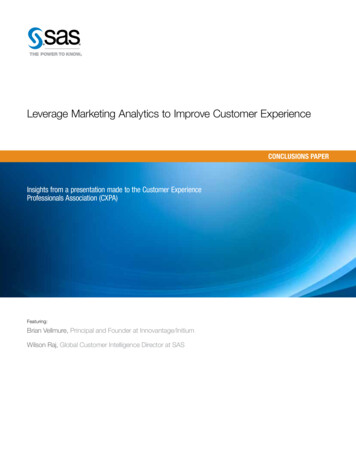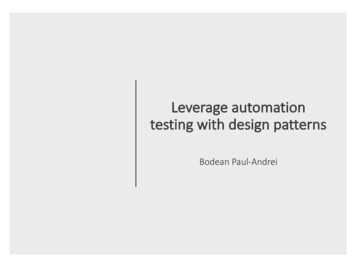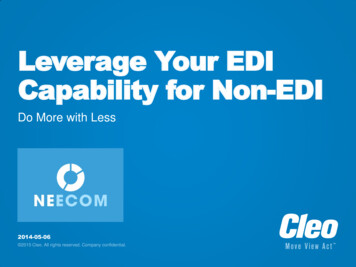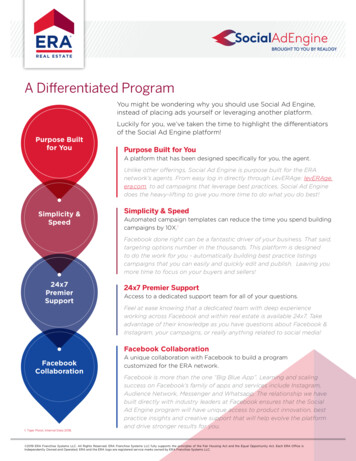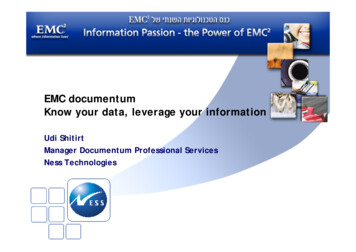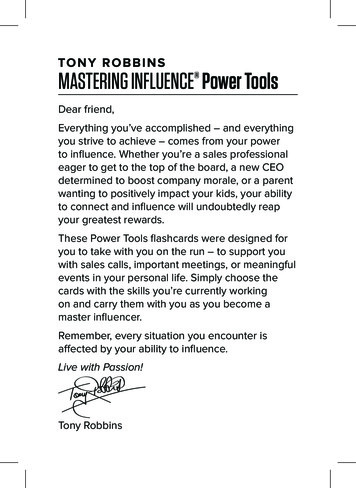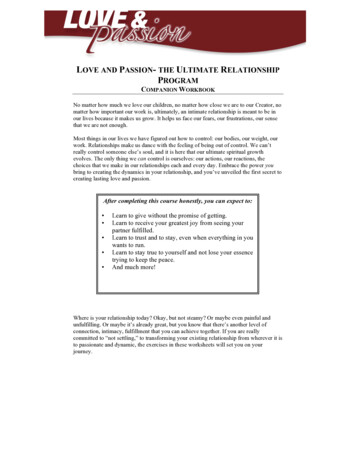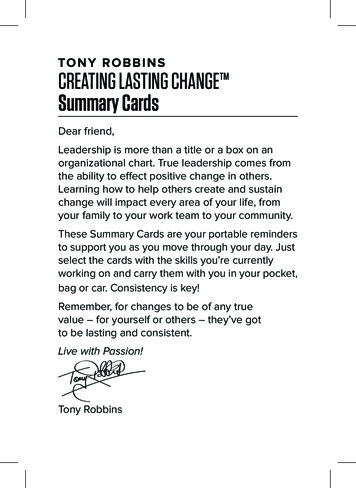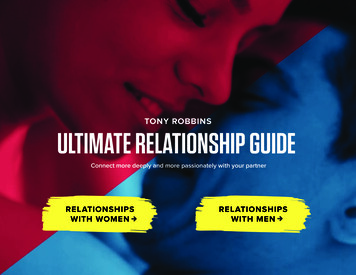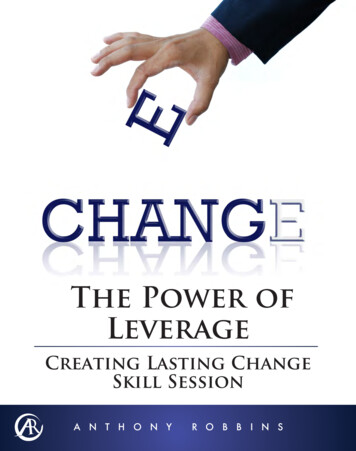
Transcription
The Power ofLeverageCreating Lasting ChangeSkill SessionA N T H O N YR O B B I N S
ThePowerof LeverageCreateA DailyPractice & Unleash Your PassionWhy Do People Fail to Follow Through?92% of the 17 million people that try to quit smoking each year fail.95% of people who lose weight fail to keep it off long term.88% of people who set New Year’s resolutions fail at their attempt.Only 10% of the population has specific, well-defined goals, but even then,seven out of the ten of those people reach their goals only 50% of the time.Have you ever had the experience of helping someone work really hard to create achange—lose twenty pounds, pay off their debts, or create a passionate love affairwith their spouse—only to find they lapsed back into their old behaviors within a shortperiod of time? Why do some people make changes that last long-term whereas othershave a hard time getting past the initial hurdles?This transformation and creation of lasting change begins with a commitment toconstantly raise your own internal standards and a continual focus on improving thequality of your life and others in every area: emotions, health, finances, relationships,leadership, spirituality, contribution, and time management.Leadership Academy provides a setting to offer this commitment to yourself and otherswhile teaching you the strategies sand tools necessary to achieve the ultimate success.One useful tool that can be the single biggest roadblock in creating change is thePower of Leverage!2Anthony Robbins
Create A Daily Practice & TheUnleashPowerYourof LeveragePassionThe Power of LeverageMaking Change a MustDiscovering the right leverage takes skill. You must understand what someone feelsthey really need and what you can use to ‘bargain’ with them to move toward moreempowering actions.Leverage is uncovering what’s most important to a person to help them make thecommitment to making a change. To ensure that change is lasting, the commitment hasto be overwhelming. It has to overcome the forces of inertia that hold our old behaviorsand beliefs in place.One of the most important precepts about human behavior and change is that at themost basic level, there are two forces that motivate people to do what they do: thedesire to avoid pain or the desire to gain pleasure. This principle is what causes the‘yo-yo’ pattern in some people: they go back and forth between taking action to createchange and losing their drive to take any action at all.Change is never a matter of ability, it’s a matter of motivation. If change is a “should,”will people change? No. Change has to be not a should, but a MUST.To access leverage, you must help someone associate massive PAIN to not changingNOW, and massive PLEASURE to changing immediately. The motivation is basedon both pain AND pleasure. Pain is short-term motivation, but you need the pleasureside for long-term motivation.The truth is everyone in life has developed different strategies or patterns for gettingout of pain and into pleasure. Thus, if we want to create permanent and consistentchange, what we must do is develop a new set of patterns of how to get out of painand into pleasure. In other words, in order to create lasting change, we must use painto get people’s attention and motivate them to want to make the change, but then wemust link pleasure to the new pattern to make it last.Anthony Robbins3
The Power of LeverageThe Process of Getting Leverage3 Simple Steps to access leverageLeadership Academy offers a variety of tools to access leverage. Most importantlyyou want to begin looking for leverage by learning more about the person’s motiveand meaning in terms of the challenge. Leverage is created by asking questions andwatching physiology for cues—look for large and small clues. If one question doesn’twork, try something else.STEP 1: LISTEN AND WATCHListen and watch for what’s most important to them. What are their beliefs about life?What is something that motivates them toward pleasure and away from pain? Learnhow they make decisions and what’s most important in their world.STEP 2: ASK & ASSOCIATEAsk 3 kinds of questions:1. Pain-associating questions: “What will this cost you?” “What has it cost you in the past?” “What is it costing the people you love?” “What is it costing you in (vehicle—work, family, etc.)?”2. Questions that demonstrate inconsistency with what’s important to them: “How does smoking keep you from being close to your family?” “Is a leader of people so undisciplined as to need to sneak off to grab acigarette?” “How can smoking make you feel good when you tell me that yourcompany hasn’t promoted you because you smoke?”3. Pleasure-associating questions: “If you change this now, how will your life be?” “What will you gain?” “What will it mean for the people you love?” “What will it give you?”Step 3: CheckAsk questions to make sure they are emotionally associated to the massive, immediatepain of not changing, and the massive, immediate pleasure of changing now.If the commitment is not clear, go back to steps 1 and 2. Make sure you are using what’smore important to them and not you.4Anthony Robbins
The Power of LeverageLeadership AcademyBecome a Force for GoodOnce you understand and master these 3 simple steps of accessing leverage to createchange you can use it in either your own life or to help someone you know change in anarea that matters most.At Leadership Academy you will gain a much more in depth understanding of this 3 Stepprocess and learn additional strategies and follow up questions. You will also practice thistool on others around you after learning and exploring the fundamentals in human needspsychology in a variety of specially designed skill sessions.Outcomes of Leadership Academy Include: To understand the philosophy and core tenets of Human Needs Psychology andhow it can be applied to immediately improve the quality of people's lives. To master the Seven Master Steps for Creating Lasting Change in any context. To gain practical experience in applying some of these tools in real life situationsto create change. To understand not just the individual, monadic psyche, but the super-individualstructures arising out of the interactions between individuals. To learn how to change through action. To understand and learn how to use injunctive language—the language ofdirectives. To be able to use a variety of strategies to solve the most common conflicts andchallenges in your family life.We are leaders who engage the Force for good;who are unreasonable in our expectations anddemands of ourselves; and who are constantlytraining ourselves to be in that magical statewhere this force is flowing through us. And, as aresult, we awaken all those around us.—ANTHONY ROBBINS 2012 Robbins Research International, Inc. San Diego, CA. All rights reserved. Unauthorized duplication of anyportion of the audio, video or written materials contained is a violation of applicable laws.Anthony Robbins5
leadership, spirituality, contribution, and time management. Leadership Academy provides a setting to offer this commitment to yourself and others while teaching you the strategies sand tools necessary to achieve the ultimate success. One useful tool that can be the single biggest roadblock in creating change is the Power of Leverage! Why Do People Fail to Follow Through? Create A Daily .
